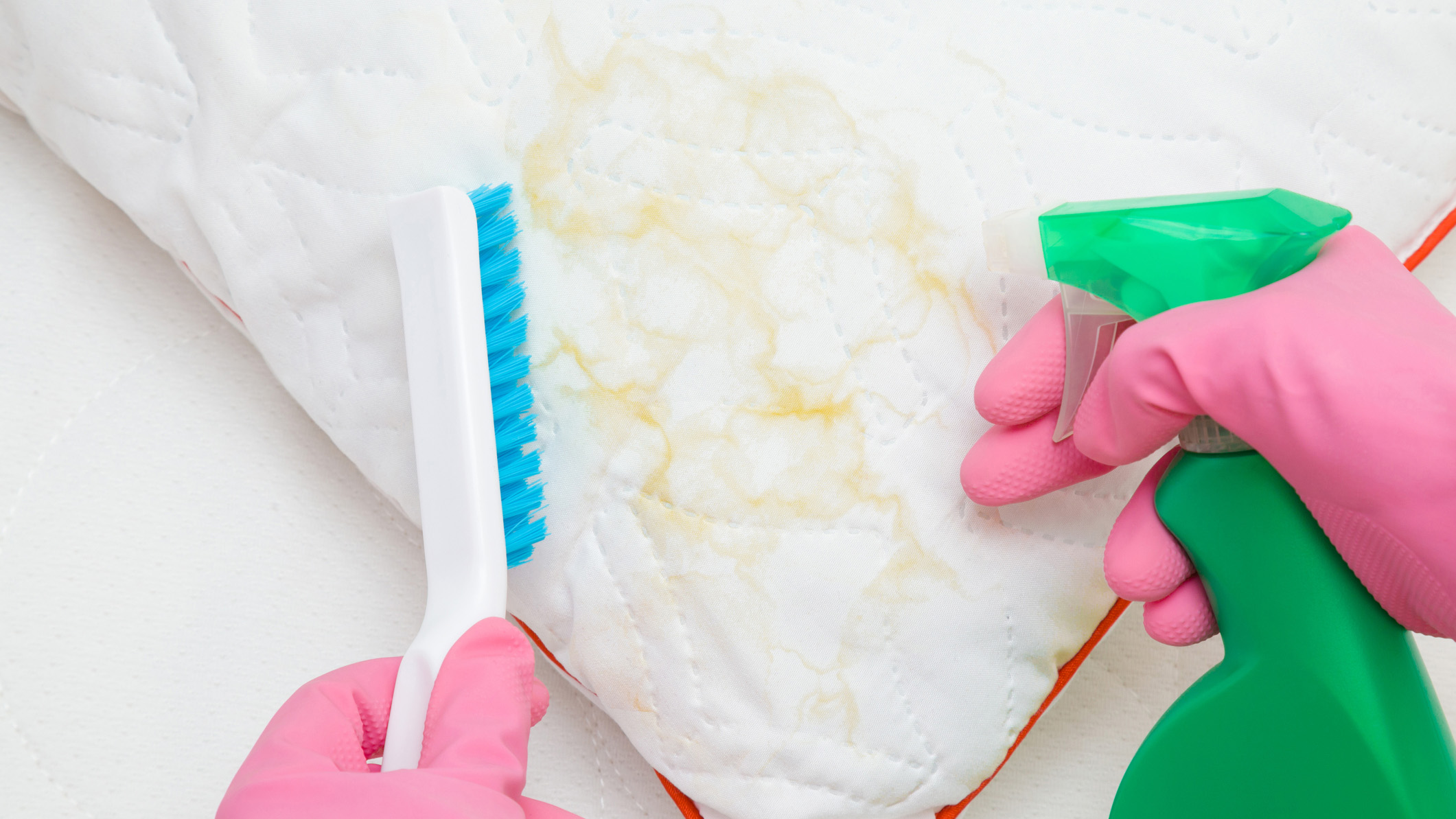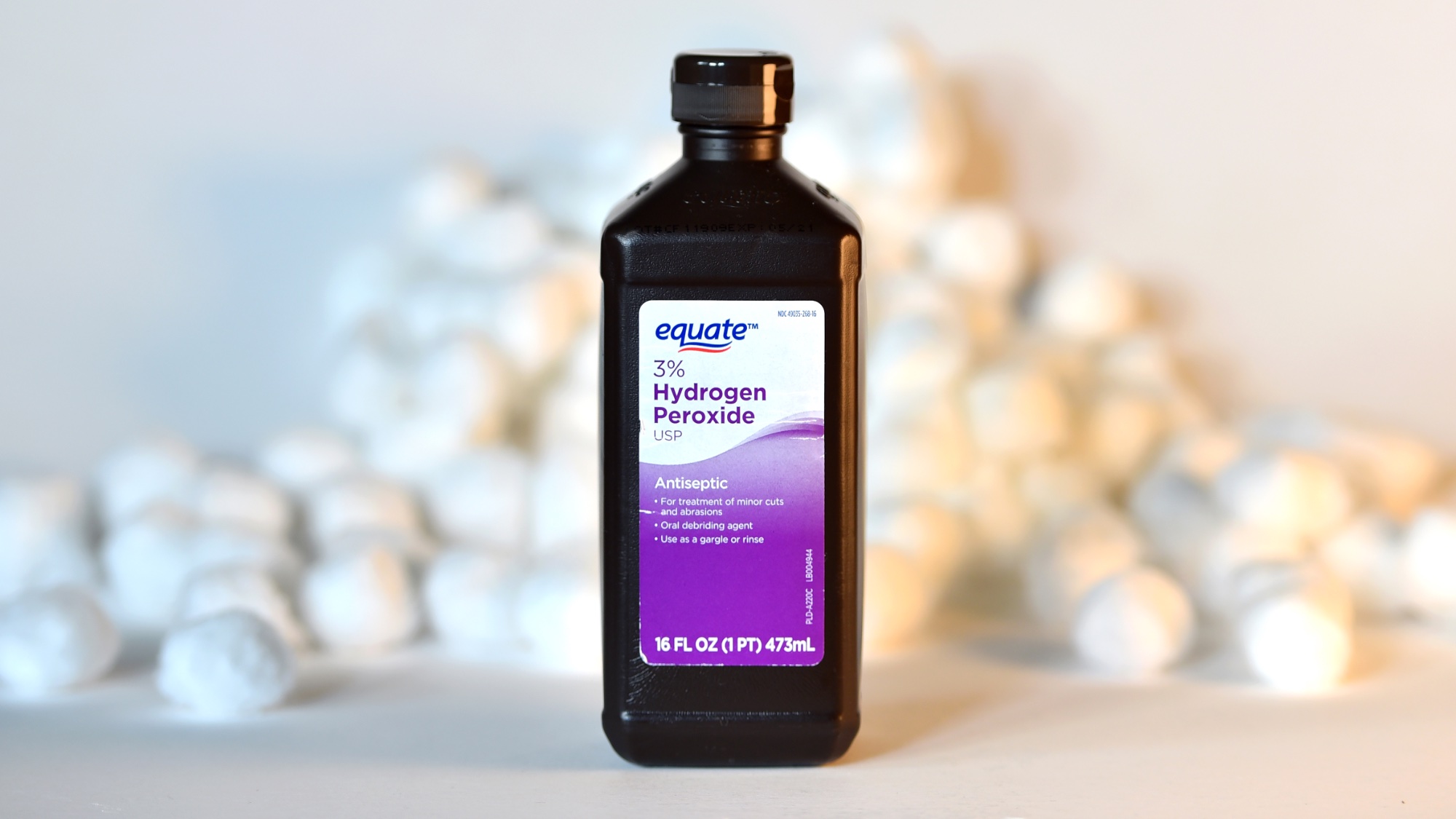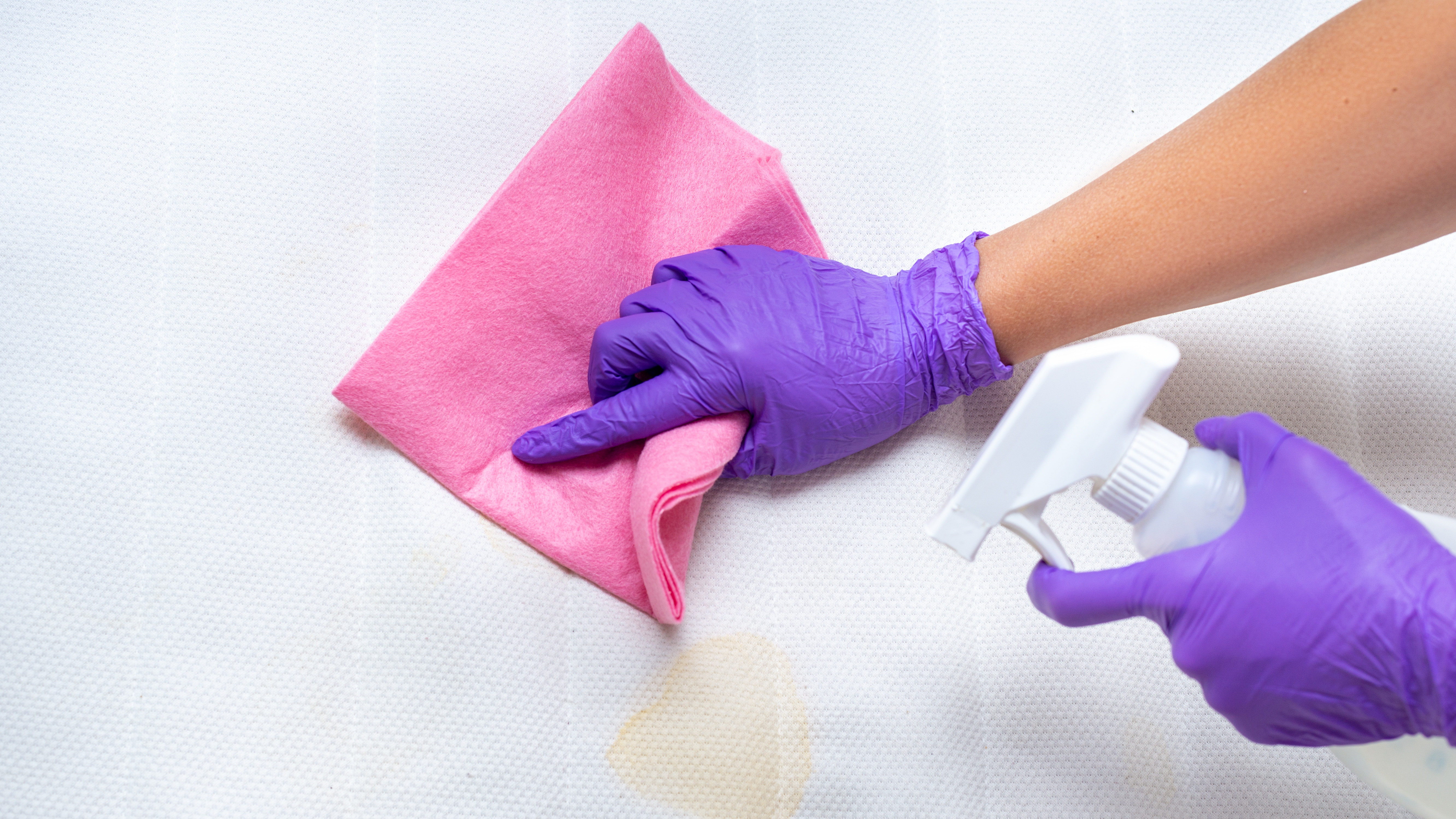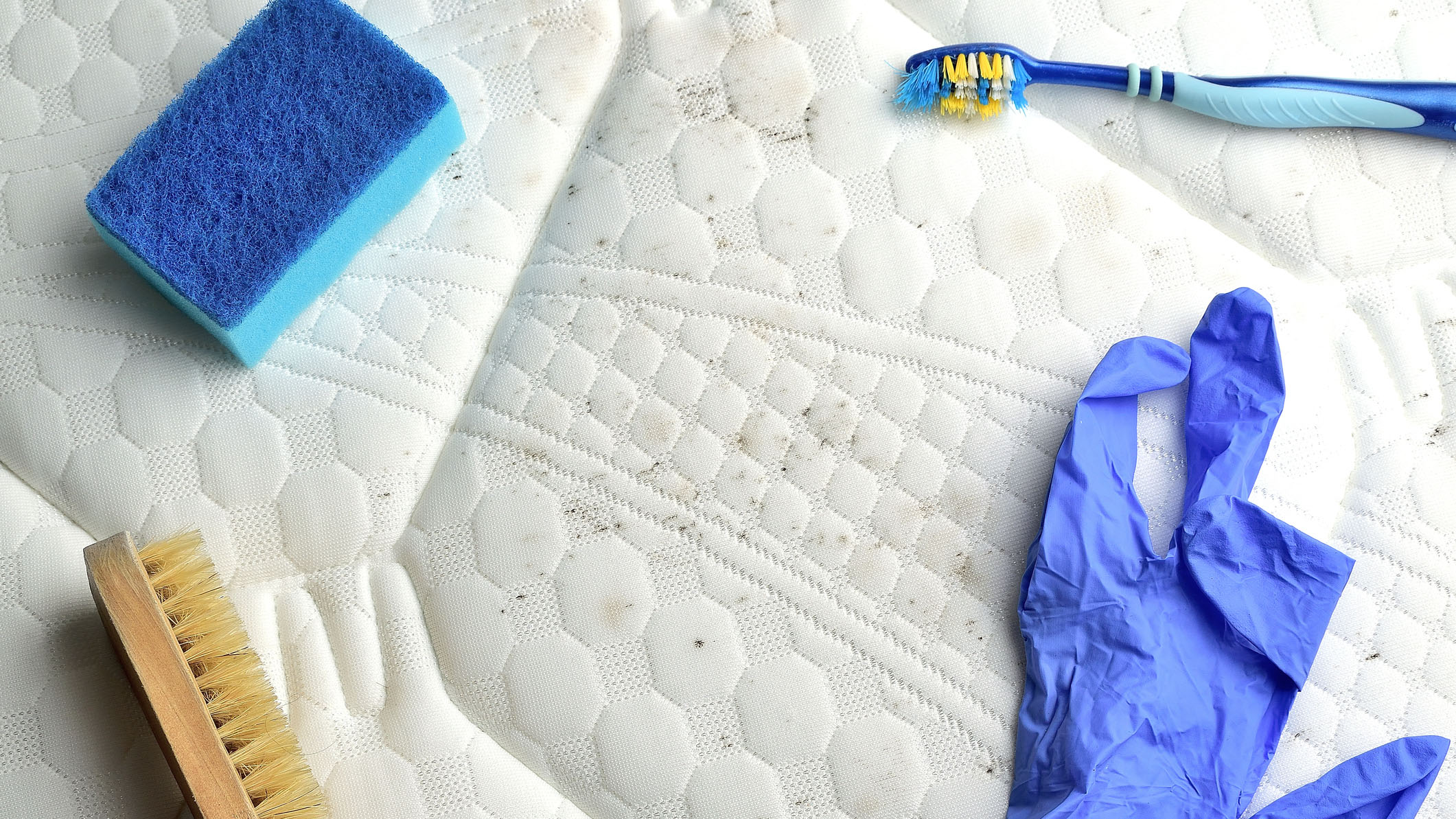It removes mattress stains in minutes — but is cleaning your bed with hydrogen peroxide safe?
Hydrogen peroxide is safe to use on your mattress, provided you use it correctly

Even the best mattresses aren't immune to becoming blighted by yellow stains (unless you're using a decent mattress protector, of course). Hydrogen peroxide is a popular cleaning agent used to remove stubborn stains from mattresses - but is it safe?
The good news is that cleaning your mattress with hydrogen peroxide is safe, provided that you use it correctly. If you've recently bought one of the year's best mattresses (or plan on buying one in the upcoming Memorial Day mattress sales), it's natural to want to keep it looking in tip top condition.
Without a mattress protector in place, yellow stains caused by sweat, body oils, urine, dust, dirt and other debris will begin to build up. Hydrogen peroxide is a powerful cleaning solution that helps shift stubborn stains in minutes. However, if you don't use it properly, you could cause lasting damage to your bed.
What is hydrogen peroxide and what is it used for?

Hydrogen peroxide is a versatile cleaning and disinfectant agent found in many household products, including dyes, bleaches, surface cleaners and disinfectants. It’s essentially water with an extra oxygen molecule. This extra molecule completely changes the properties, turning this water into an antiseptic and bleaching agent.
Because hydrogen peroxide is a mild bleaching agent, it does a great job of getting stains like urine, sweat and blood out of mattresses. It also has the added benefit of killing germs and bacteria, making it an effective way to clean your mattress without leaving any harmful residue behind.
Hydrogen peroxide is available in different strengths, ranging from 3% (which is the typical concentration for household products and what you’d need to clean your mattress with) through to 90%, which is not intended for use at home.
Is it safe to clean your mattress with hydrogen peroxide?
Provided that you are using a concentration level of 3%, it is completely safe to clean your mattress with hydrogen peroxide. However, despite it being great at removing stains and killing germs, it may also bleach or discolor your mattress.
Sign up to get the BEST of Tom's Guide direct to your inbox.
Get instant access to breaking news, the hottest reviews, great deals and helpful tips.
For this reason, it's best to dilute your hydrogen peroxide before using. To do this, mix one part hydrogen peroxide with two parts water. We recommend adding this mixture to a spray bottle to ensure you don't saturate your mattress when cleaning. Always blot the stain rather than rubbing it, as rubbing can cause the stain to spread and ultimately damage the fabric.

Despite this being a mild bleaching agent, hydrogen peroxide is still a chemical and it does have a very strong odor. So always ensure the room is well ventilated whilst you’re cleaning your mattress with hydrogen peroxide. Hydrogen peroxide can also cause some irritation to the skin, so you may want to wear gloves whilst doing it too.
Before you start any cleaning, it’s always a good idea to follow the manufacturer’s instructions and test in an inconspicuous area being applying the solution to a large part of the mattress to ensure it doesn’t cause any damage or discoloration.
Pros of cleaning your mattress with hydrogen peroxide
1. Effective stain removal
Hydrogen peroxide is known for its ability to break down and remove mattress stains. This is why it’s so good for cleaning mattresses which are naturally prone to staining from sweat, blood, urine, body oils and dirt. You can also add some bicarbonate soda to your spray bottle without it having any kind of reaction. Instead the addition of the bicarbonate soda will also work to breaking down the proteins that are causing the stains and help to remove any odors that come with the stains.
2. Kills bed bugs and dust mites
If you have signs of bed bugs or dust mites then cleaning your mattress with hydrogen peroxide can play a huge part in killing them. Hydrogen peroxide kills both bed bugs and dust mites on contact and whilst you’ll have to take some other action to get rid of dust mites from your mattress, pillows and bedding, such as vacuuming the surface and washing your bedding on high heat, this will help.
3. It'll help remove odors
Sweat, natural body oils, dirt, dust and dander don't just cause stains to appear, they can also leave lingering odors. The good news is that cleaning your mattress with hydrogen peroxide is a great way to neutralise the smells trapped in your mattress and leave you with a fresh smelling bed. Hydrogen peroxide does this by breaking down the compounds that cause unpleasant smells. It’s also an environmentally friendly way of getting rid of smells unlike the air fresheners and cleaning sprays that have a whole host of strong chemicals in them.
4. It's a powerful disinfectant

There is a reason why hydrogen peroxide is present in many cleaning products. It’s a powerful oxidizing agent which can quickly destroy bacteria, viruses, fungi and mold spores. So if you’re using hydrogen peroxide to clean your mattress then it will help kill any bacteria that is living on it. Also, unlike some other disinfectants, hydrogen peroxide doesn’t leave behind any harmful residues that could potentially lead to skin or respitory irritation.
Cons of cleaning your mattress with hydrogen peroxide
1. Potential damage to the fabric
When it comes to cleaning your mattress, what type of mattress you have makes a huge difference to what cleaning method you should use. Latex and memory foam mattresses and don’t respond well to being oversaturated. Using too much hydrogen peroxide to clean the mattress it could seep into the foam potentially causing damage and deterioration of the material. And whilst hydrogen peroxide is considered a mild cleaner, it can still cause fabric to become bleached or discoloured. That’s why we always recommend you try a small spot to test the mixture out before spraying your whole bed.
2. May cause some irritation
Hydrogen peroxide can cause skin irritations, especially when used in high amounts or potency. If you have any damaged or broken skin such as cuts or abrasions, hydrogen peroxide exacerbates the irritation and causes a delay in healing. People with skin conditions like eczema or dermatitis may also be more prone to experiencing irritation from hydrogen peroxide. It’s important that if you’re using it to clean you wear glove and a mask and do so in a well-ventilated room. Also ensure you use 3% hydrogen peroxide as this is the safest version and recomended for home use.
3. Stains could be made worse
It’s really important when using hydrogen peroxide to clean your mattress that you don’t rub at any stains. Instead, spray or apply the hydrogen peroxide directly to the stain and then blot the wet area. Blotting helps to absorb the stain without apply any excess force. When you rub stains, especially when using a chemical like hydrogen peroxide you risk breaking down the stain which then spreads more easily across the fabric surface.
Should you clean your mattress with hydrogen peroxide? The verdict
The decision to clean your mattress with hydrogen peroxide depends on various factors such as what type of mattress you have or what kind of stains you want to get rid of. However, hydrogen peroxide is widely considered a safe and effective way to deep clean your mattress.
Hydrogen peroxide does a great job of getting rid of stubborn stains caused by blood, urine, sweat and sebum. It can also kill bacteria and lift any nasty odors that are hanging around. However, for all it’s good points there are a couple of things you should consider before you use it on your mattress. Hydrogen peroxide can cause some damage to the fabric of your mattress, as it is a mild bleaching agent which means it could potentially discolor your mattress. We always recommend trying a small patch somewhere that can’t be seen before treating the whole surface.
It can also cause some skin reactions to people who may have sensitive skin conditions such as eczema or psoriasis. Always use gloves when handling the hydrogen peroxide and always use in a well ventilated room. Otherwise, we think a 3% hydrogen peroxide is a safe and effective way to clean your mattress.

Rachael is a freelance journalist based in South Wales who writes about lifestyle, travel, home and technology. She also reviews a variety of products for various publications including Tom’s Guide, CreativeBloq, IdealHome and Woman&Home. When she’s not writing and reviewing products she can be found walking her Sealyham and West Highland terrier dogs or catching up on some cringe-worthy reality tv.
